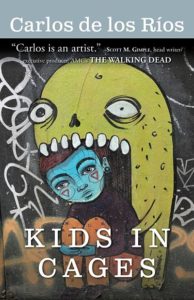LOCAL AUTHOR SPOTLIGHT, March 2021
 “Kids in Cages,” by Carlos de los Rios
“Kids in Cages,” by Carlos de los Rios
What does a Mexican American man see and feel when he’s raised in two worlds? Carlos de los Rios grew up in the affluent California suburb of Pebble Beach, but his parents’ roots, and much of his family, remained in a poor area of South Texas.
The despair of some of the most disadvantaged, desperate people weaves its way through the work in this gritty, engaging book. Toward the end, many of the stories de los Rios fixes into free verse tell of poor Mexican families who lost children to draconian immigration policies. Hence the title of the book, pulled from one of the poems, “Kids in Cages.”
For those who know de los Rios as an acclaimed screenwriter, this book will take you inside the layers which, when peeled back show the core of the man.
Q1: Carlos, your poems and prose were poignant and, at times, heartbreaking. Did your own childhood inform your writing? If so, how?
A1: I was raised in Pebble Beach, California, a wealthy community. But my public–school teacher parents moved there by accident from a part of South Texas that is to this day one of the poorest in the country. We used to spend our whole summer with family in Texas and the dichotomy of the two worlds was always so confusing to me. In one world I saw movie stars on the street and at the market but in the other world I saw alcoholism, abject poverty and loose parenting. So, I was aware from a very young age that there was more to the world than just pretty roses and smiling faces. The more I peeled the mystery back, the more I learned that the best people were not always the rich ones but rather the poor ones who never let themselves get down despite their clear disadvantages. That strength of character in the less fortunate in my own Texas family made me question so many aspects of what American society was selling and why. It crept me out. I began a habit of trusting nothing I was being told was true. And that made me open-eyed to hypocrisy and incongruency in the public story of our society. That was the start of the real writer in me.
Q2: “Kids in Cages” includes work of free-verse poetry and one short story. What made you combine the two genres?
A2: I’ve always worked in free verse and short story and I find that they are not as dissimilar as one might think. My emphasis has always been on storytelling no matter what the format.
Q3: Why did you choose to highlight the emotions of anger, desperation and lack of control/surrender in your poetry?
A3: I find that many people are lost and desperate out there and they are often the ignored. I find it my job to highlight their plight.
Q4: Toward the end of the book, many poems were directed toward political action that separated Mexican and Mexican American children from their families. What personal experiences/beliefs/emotions compelled these poems?
A4: I was shocked by the separation of families from their children. Deportation together is better than that. And then they lost track of the parents and many families are still not reunited and may never be.
Q5: As a screen writer, teacher and editor, why did you choose poetry to tell this “story?”
A5: I love the freedom of poetry and I find it can sometimes get inside people in a non-intellectual way but rather a purely emotional one.




